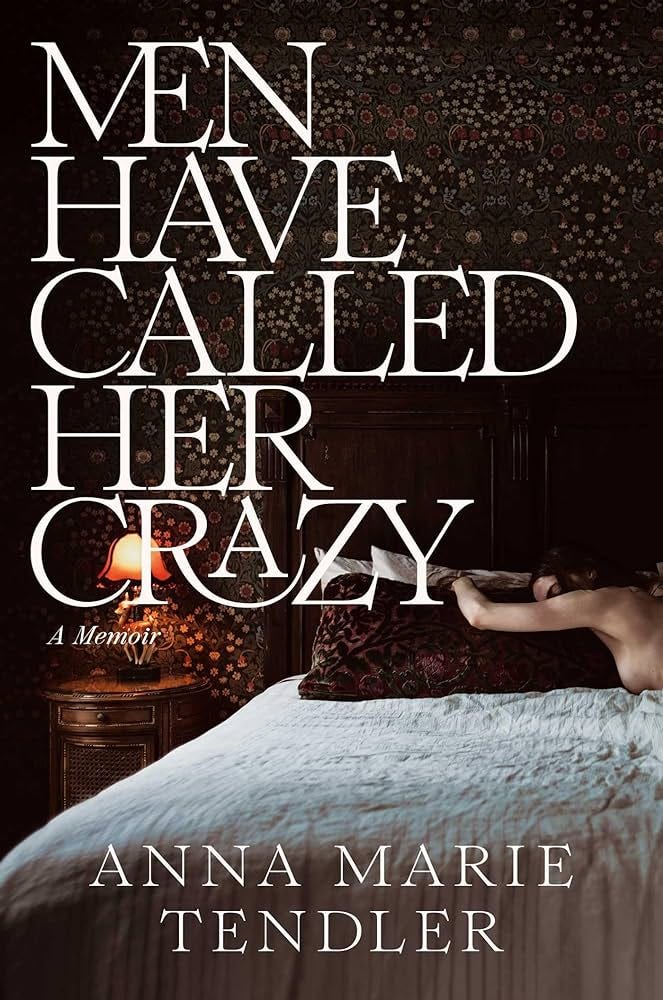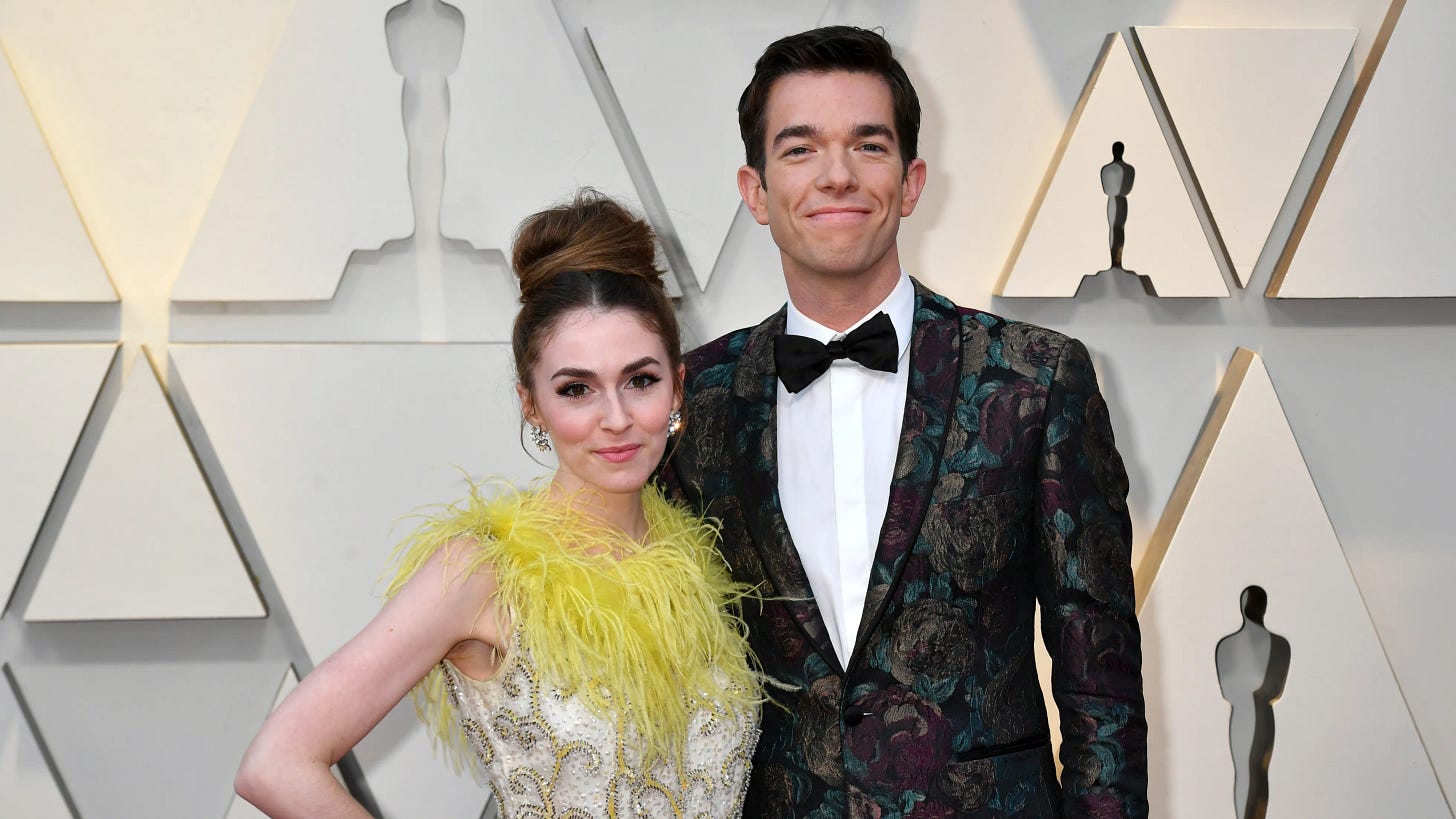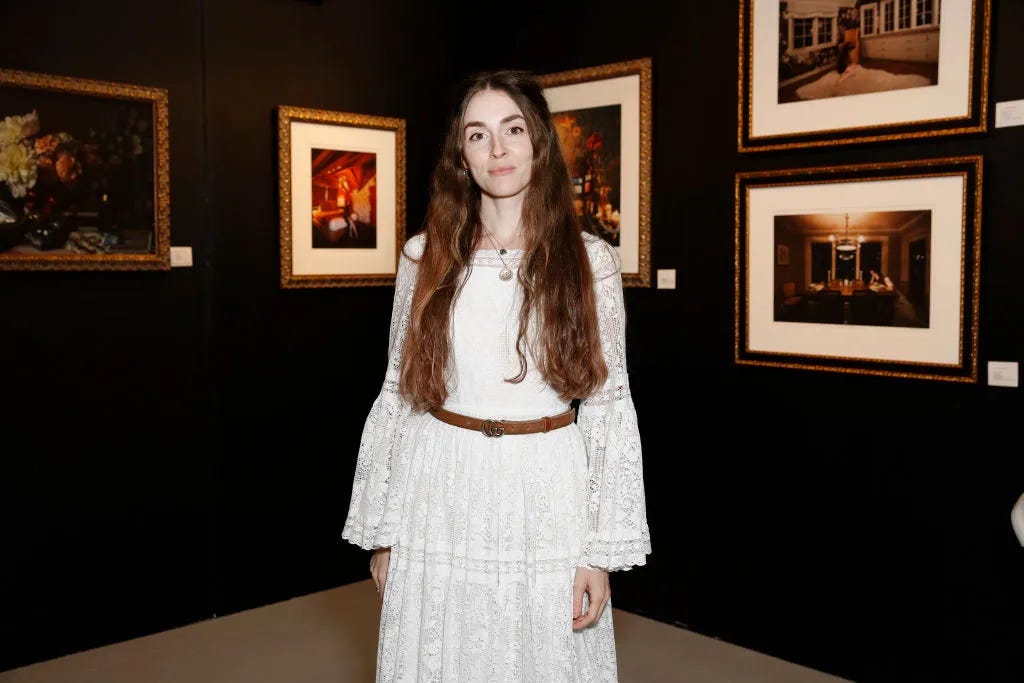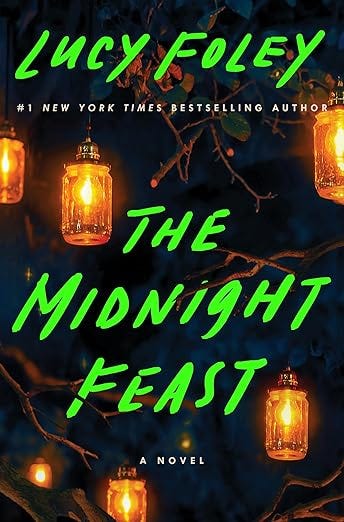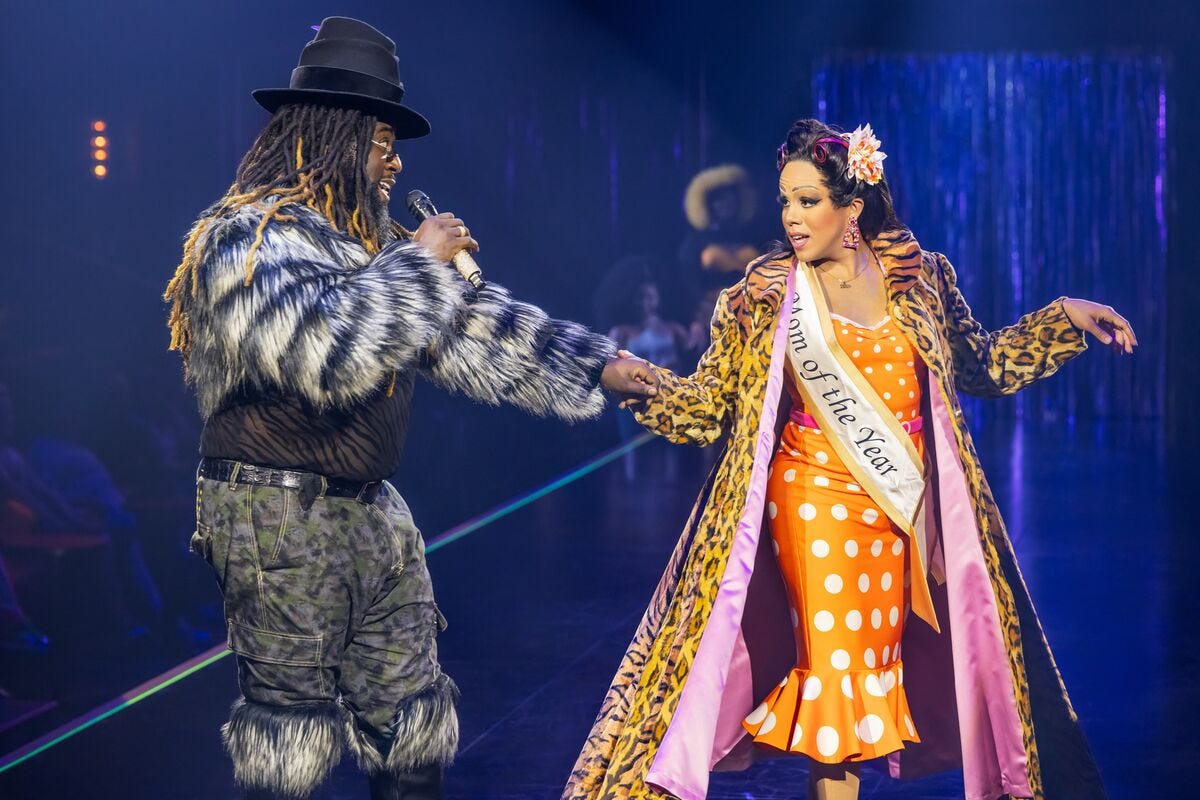SPOILERS AHEAD for Anna-Marie Tendler’s memoir, Men Have Called Her Crazy (if you care about nonfiction spoilers, which I do sometimes).
The discourse on Men Have Called Her Crazy has been … interesting, to say the least. Some people love it and others really, really fucking hate it. I was really not expecting this intense of a reaction, so I want to dissect it a bit and offer my own thoughts on the topic.
For context — in the unlikely event that anyone wanted to read this book somehow not knowing who she is — Anna-Marie Tendler is a multidisciplinary artist previously best known as the wife of comedian John Mulaney, frequently mentioned in his standup. In 2020, however, their public image changed significantly, as Mulaney went to rehab for a substance use disorder relapse, and, early in 2021, announced their divorce. Within a few months, people found out that he was having a baby with actress Olivia Munn, which was a, let’s say, curious timeline! This made Anna the scorned woman of the century, led to significant attention to her photography and other artwork, and resulted in her becoming a celebrity in her own right.
Now we’re here, at the release of Men Have Called Her Crazy. And after much thought, surfing bookstagram, hearing from friends, and lurking on Reddit, there are a few aspects of the book that people are discussing, which I’m going to try to break down here in some vague categories.
the john mulaney stuff. or lack thereof
When Men Have Called Her Crazy was announced, people were pretty fucking excited — she has lots of her own fans, sure, but many were really anticipating a brutal takedown of Mulaney. But, aside from a few oblique references to her divorce, Tendler never even says her ex-husband’s name, nor does she reveal any details about their relationship. Naturally, this causes a real gaping hole in the narrative that I’m not sure people who don’t already know who Tendler and Mulaney are and the general timeline of their relationship breakdown would be able to fill in for themselves.
Considering the structure of the novel and its exploration of several smaller relationships she’d had, and with the central event of the novel being her entry into mental health treatment, which was, at the very least, tangentially related to the breakdown of her marriage, it certainly would have been beneficial to the reader to have some more information. Of course, we don’t know if this was an intentional artistic choice or if it was borne of the very real possibility that she signed an NDA as part of their divorce agreement. I have no idea which one it is, but I’d honestly lean towards the former — she doesn’t seem to have much of a desire to revisit that part of her past.
To be honest, I wasn’t horribly disappointed by the lack of her discussion of her marriage and with Mulaney in particular. I think one of the themes of the book is that maybe it doesn’t really matter who the man in question is; at the end of the day, we live in a patriarchal society designed to subjugate people of marginalized genders. There are aspects of each of her shorter relationships that bleed into one another in spite of who she’s talking about or in what station of her life she’s in, and that can be powerful!
However, I do think that the omission of this pretty significant relationship in her life left some space that could have been filled in in a meaningful way (not to mention some much-needed context that would make the book appeal to people outside of the specific circle of individuals who follow her on instagram). It speaks more to the lack of proper structure and real plumbing of her own depths in the novel as a whole than anything else. And I think that there was a better way to write this memoir where this specific relationship wouldn’t have felt as relevant. Perhaps that would mean focusing exclusively on her stay in treatment with more scattered anecdotes about her life; I’d be in favor of a collection of essays, which could have been more suited to her writing style and to the stories she aims to tell.
Some people are taking this omission as a reason to be like, there was no point to this book without her writing about Mulaney, especially because she writes in detail about her other relationships. But I think that Tendler has interesting life experiences to share, and you absolutely do not need to be a particular celebrity to be warranted in publishing a nonfiction work about your own life. In fact, I’m usually inclined to dislike celebrity memoirs in general because I don’t particularly care about how people got famous or their famous friends. I can read that junk on Page Six. So I think critiques that the book was bad because she never talks about her famous ex don’t quite hit the mark. But I do agree that, given the structure and formula of this memoir, it would have helped.
discussions of her mental health
Some of the critiques about Tendler’s persona, namely the idea that she’s selfish and self-centered, are a little harsh. Everyone manifests anxiety and depression differently. I had no issues with how she behaved and thought in her treatment program because she was in crisis and in mental health treatment. You probably wouldn’t be particularly conscientious of everyone else if you’ve been enduring serious mental health issues. Though, again, context really would have helped us understand more about her day-to-day life and why she entered treatment in the first place.
She is obviously still a ~work in progress,~ as we all are for our whole lives, and I can very much appreciate that this book probably helped her work through a lot, even if she wasn’t able to articulate those things in her writing. However, the final chapter is where her seeming lack of clarity really emerges in a pretty sad and painful way. This is sort of the hardest part to write because I really resent everyone’s armchair diagnosing of her and I don’t want to do the same. But after she finished the rest of her book, she goes into detail on her final diagnostic report from her treatment team after her inpatient stay.
She takes some issue with the way the report is written — for example, some parts say that she “claimed” something to the doctors rather than immediately taking them as truth. Yes, sexism in medicine is a deeply disturbing and prevalent problem (I personally struggled for many years to get a diagnosis for something life-impeding that should have been caught when I was 14. as a far more serious example, Black pregnant people have significantly higher mortality rates during childbirth than those who are white). But, once again, she doesn’t really engage with it in a way that’s meaningful; instead, it feels like we’re in women’s studies 101, where we’re learning about the pitfalls of language and why ships are referred to with “she” pronouns. Not an insignificant thing, of course! But it’s not the high level of discourse that I personally expected and think I was implicitly promised.
She also immediately rejects the idea that she has issues with maternal figures, despite some pretty clear evidence of a turbulent relationship with an emotionally unstable mother in her youth that would affect anyone (her family’s impact on her is barely discussed in general). It feels like a throwaway line in the book that only serves to reinforce the theme of men being terrible (they are, of course) and doesn’t come with any real analysis, which is disappointing. A massive part of the memoir is about her fucked up relationship with her unprofessional ass female therapist, but gender’s never mentioned there. Not that gender discrimination is equal for different genders in ANY sense of the word, but, again, her points would have come across more powerfully if she had just delved into things a bit more.
She revealed, at the very end, a borderline personality disorder diagnosis. She is angry and defensive about this and point-blank disagrees with it. I can’t really speak to this, but I’ve seen quite a few readers online with BPD clocking her behavior from the start of the book and being dismayed that she wouldn’t even think to receive it. Mental health and our history of treating marginalized individuals in the field is immensely complex and, at times, quite shameful (I work in the addiction field and its mistreatment and stigmatization is deadly). That being said, it sort of was the cherry on top of my growing feeling of unease that, perhaps, she was not ready to write this book or to look outside herself a bit more and grapple with these issues in a more thoughtful way. Turns out there’s an r/annamarietendler, and this comment by an individual with BPD lays this whole thing out incredibly well.
the simplistic portrayal of feminism
I also understand the criticism that her portrayal of feminism is a little regressive. She does punctuate nearly every thought she has with an “I hate men” or “it’s because of men” or just “men.” To be honest, I have more of an issue with it as a lack of writing style than anything else, lol. But, look, similarly to the above criticism on her lack of self awareness, I think it’s completely fine and powerful to share thoughts like that. Sometimes life can just be reduced to the simple heartache of living in a patriarchal society. I really don’t have an issue with it.
That being said, these observations — or lack thereof — do grow rather exhausting and rote. Again, there’s just not much literary merit to what she’s saying. It really feels like it’s for young women who are just now starting to question the patriarchy as a whole and how it’s impacted their own personal relationships and nothing more than that. Kady Ruth Ashcraft writes in an excellent review of the book for Jezebel:
These observations are not wrong in any way, but hardly feel enlightening enough to carry a memoir about men gaslighting women (a worn-out term I feel reluctant even using in 2024.) I regularly see TikTok creators wrestling with feminism in ways that are more revelatory than this.
My biggest issue here is that her thoughts add practically nothing to the feminist genre as a whole. When your book is called Men Have Called Her Crazy, you’re setting up expectations for a certain kind of narrative impact, especially in an age where we, more than ever, are prepared to wrestle with and discuss gender and sexuality in more meaningful and challenging ways — and, in some cases, facing increased censorship for doing so. And if I’m picking up a book like this, I’m expecting to read something that feels like it’s really contributing to our culture.
her writing in general
This is obviously a really vulnerable book, but, for some reason, it feels like several beats of her story are missing, and not just the period of time in her marriage. She touches on things that are very relevant to her journey — like her relationship with her volatile mother — and sort of moves on without giving us fulfilling analysis. It sometimes feels like we are just hearing about events in her life without understanding what they mean, or knowing if she even understands what they mean. This ties into the discussion of her mental health in that it doesn’t totally feel like she’s processed some of these things in a way she can properly articulate.
We also just don’t get to know much about her or her life. Things happen to her, yes; but rarely do we get to understand the development of her relationships in depth, nor do we really get a glimpse of her own role in these relationships. Quite frankly, I want to know how these have impacted her in her new life! She talks briefly about moving forward and pursuing more of her artistic passions, which has led to her having a career of her own, and I appreciated her transparency on her feelings of ennui and boredom as she struggled to figure out what she really wanted to do. But I just don’t really know how exactly these evolved. She clearly has stories to tell; we just didn’t really hear them.
All aspects of our lives can be plumbed for content — in a meaningful way, if we want it to be — and the artistic depiction of the seemingly mundane is now incredibly common. If it’s not done well or with clear intention, it’s boring.
If you want a memoir about crazy exploits and sugar daddies in New York City, you’re better served reading Julia Fox’s Down The Drain. If you’re interested in a detailed narrative about a woman’s sexual exploration, just pick up Molly Radden-Winter’s More: A Memoir of Open Marriage. Hell, want these themes explicitly laid out in fiction? Nightbitch, baby (did anyone watch the movie trailer? am dying to discuss). Sure, people have wildly differing takes on those as well, but at least they’ll provide you with similarly raw but significantly more nuanced takes on heterosexual relationships and patriarchal culture.
Look, there are plenty of things in this book that I enjoyed and thought showed promise. Some of her observations and her matter-of-fact way of writing about her experiences are clever and interesting — I was pretty entertained by her dark humor and really moved by certain parts of the book. Her chapter on her dog Petunia’s death had me tearing up. I found her experiences in the dating world to be relatable. Many people online (and in real life, I have real life friends who read, I promise) loved the book and found incredible value in it. Women do experience relationships like these on a day-to-day basis. I completely understand and celebrate everyone who found this as much of a healing and cathartic experience reading it as she clearly did writing it, and I feel a lot of joy for her there. Also, she has a calming audiobook voice.
I guess I just take some issue with the way some people are talking about her. I had more of an issue with this book’s lack of literary merit than anything else. I really don’t think she deserves some of the hate she’s been getting. At the end of the day, perhaps she did not have the bandwidth or the tools to overcome the myopic view of her world and experiences (which we all share, to a degree), at least in print. I have a lot of respect for her as an artist and I appreciate what this book means to her and many, many others. Does that mean it’s particularly good or notable? Not really. And that, my friends, is my biggest disappointment: it should be notable. And it’s just not.
other media/stuff
mystery junk
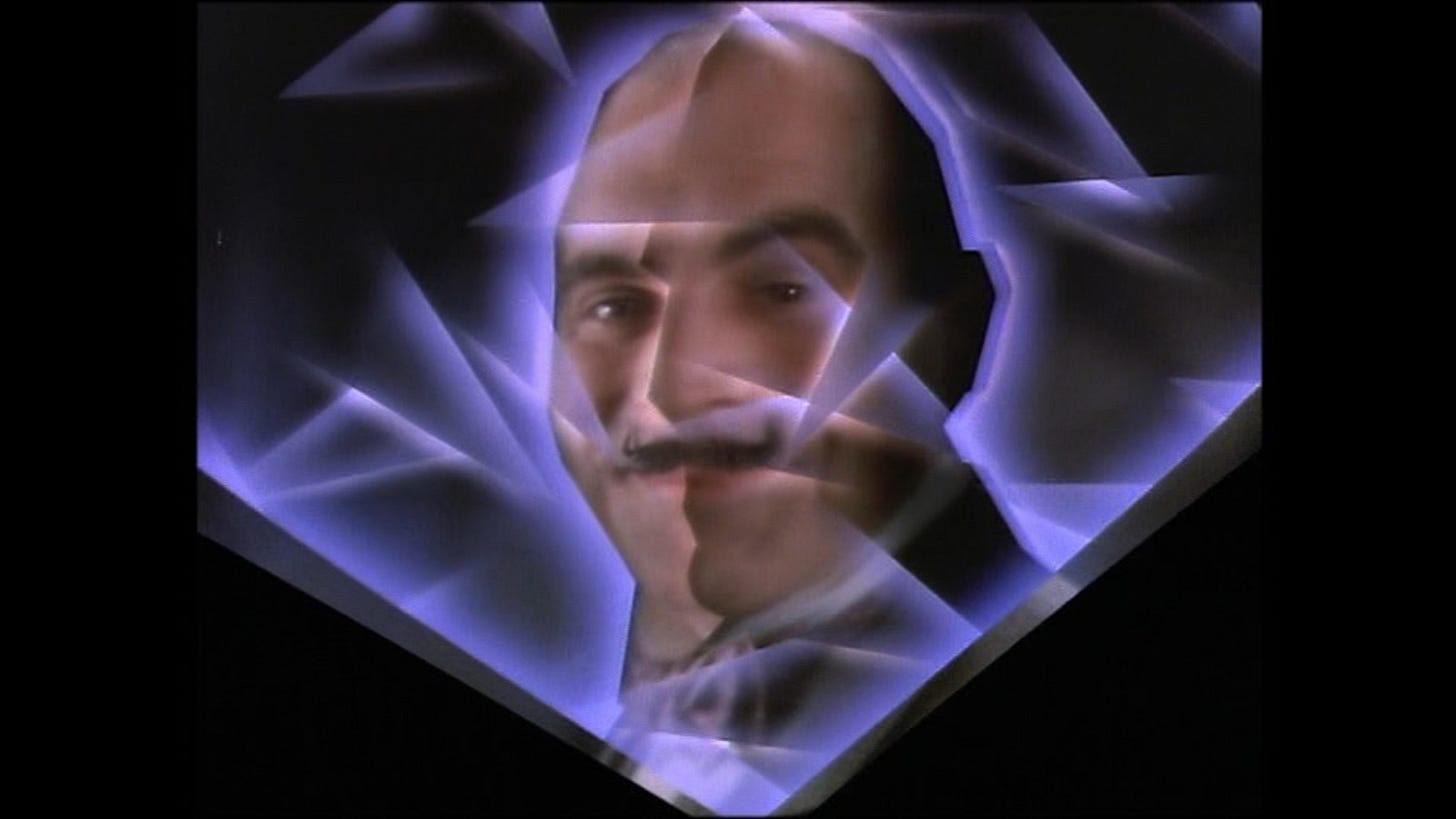
I’ve been on a real mystery kick recently. In one of my recent newsletters, I casually mentioned The Murder of Roger Ackroyd. I forget why. Maybe I didn’t even mention it, but I thought about it? Either way, that kind of set me off on a quest to see if I could watch a version of the book, which I found in the form of the hit 1990s BBC series Agatha Christie’s Poirot. It’s a lot of fun and has given me the chance to ingest some of Christie’s short stories and such that I hadn’t previously heard of.
Going off of that, John and I decided to start watching Columbo. This is also very interesting and the exact opposite of Poirot because in Poirot, we are investigating ALONGSIDE the pithy Belgian detective. But in Columbo, we SEE the crime happening in detail in the first ten to twenty minutes of the show and we have to watch our fearless schlub figure out how to nail the suspect, who’s usually committed a pretty seamless crime. What tiny thread will he unravel? What unexpected loose end will he find? And he’s the opposite of Poirot in that he plays a sort of bumbling guy, not a genius detective who knows he’s a genius (in an endearing way, of course). Loooove these guys.
I then made the idiotic decision to try to read Lucy Foley’s newest mystery, The Midnight Feast. Holy FUCK, was this stupid. I listened to most of it and then ran out of e-book listening hours on spotify (I’m on an audiobook kick for whatever reason) and then found an extremely easy to find free PDF for the last three chapters and it was equally dumb in print as it was in voice. I was genuinely pissed at how predictable almost everything was and how irritating every twist was. The whole novel is building up to something it wants us to believe is fucking crazy and ties all of these threads — TOOOOO MANY THREADS jesus fuckinggg christ — together in a cool way. What it builds up to is stupid garbage. Maybe watching so much Poirot and Columbo has made me a genius at solving mysteries, but I know that’s not true because I haven’t picked up Cain’s Jawbone in about three months, so it’s probably just a predictable, anti-entertaining book. I thought that listening to it would be a fun change of pace, too, and would throw me off the scent more than if I was seeing words on the page, but no, I just got some voice actors whose vocal fry irritated me more than it should have because of the dumb shit they were saying.
I really enjoyed The Guest List and found The Paris Apartment to be fine, just a bit boring, but entertaining enough where I raced through during a day in the park, but this has me genuinely ANGRY. It’s not getting a proper review and is going in the “other” section because it doesn’t deserve more than that. All I wanted was to listen to something fun and juicy before I have to start reading multiple near-identical but somehow different translations of the same Irish text for school. And what did I get? RAGE!!!!! this isn’t a formal review I know but this is getting 2/5 stars AT BEST.
cats
I love bad movies. My favorite bad movie is the Scientology epic Battlefield Earth, a showcase of John Travolta’s like third career dip (he had so many dips before it was even 2000, I’m learning) and some pretty gnarly Dutch angles. So when CATS came out in 2019, I saw it twice in theaters for the sheer entertainment value. We all sang the mister mistofelees (spelling? I’m not checking) song together and it was really beautiful. (shoutout to my dear friend Emily Paige, the only other person on this planet who’s seen Battlefield Earth multiple times and also got us tickets to CATS when she worked at Showcase Cinemas, for fueling much of this.)
But what I saw recently wasn’t the movie. It was CATS: THE JELLICLE BALL! And my god, I would go watch it every night if I could. And I’ve experienced working at a theater and watching a show about thirty times (Titanique, you will always haunt me), so I REALLY mean it.
I am in no way a musical theater aficionado, so I’ve never seen CATS the way it was initially “meant” to be performed on stage, but I feel confident in saying this is probably the best way Cats could be performed. It combines the rich history of ballroom culture — and icons in the ballroom scene in New York — with the music of CATS, which works incredibly well because the whole musical is just songs introducing different cats, so they can just do ballroom battles in different categories and it’s perfect. The singing, the dancing, the fucking COSTUMES! (mercifully, they are not dressed as cats.) Andre de Shields was in it!
I admittedly don’t know much about ballroom culture, so probably more than a few of the specifics went over my head (I really want to rewatch Paris is Burning now), but there was a really beautiful tribute to some of the pioneers of the space, most of whom are LGBTQ+ people of color, and the whole show was filled with love for queer culture, especially in marginalized spaces. Seriously, go see this if you can. You’ll scream at least once (probably when The Rum Tum Tugger does a striptease or maybe when Mister Mistoffelees does a fucking IN AIR SPLIT).
Anyway, class started this week, so consider this my official apology for an even more scattered publishing schedule to come in the months ahead. At least you’ll get to hear about the multiple almost identical translations of an Irish text and my frustrations on dense, convoluted, and rather pointless-seeming literary theory. I looked at my syllabus and was like, wait, I have to write essays? Then I remembered I chose to apply to and am paying for an English master’s degree.
Unfortunately, like many prominent schools around the country, the university I am attending has recently put into place a policy that essentially serves to censor pro-Palestine activists. While I doubt this will be an issue in my particular sphere given my pretty rad professors, it’s a a pretty fucking horrible policy to contend with on a day-to-day basis and one I now have to think about alongside other issues of higher education censorship that I haven’t had to deal with in five years. But, look, I’d rather get booted from the school standing up against a genocide than staying silent and slipping outside with a master’s degree to a world filled with the charred flesh of Palestinian babies. All that is to say — fuck all of our institutions for their funding and active support for this yearlong (really, 75-year-long) siege on Palestine, and I feel nothing but red-hot shame every time I see a tweet from Kamala Harris and her brat campaign saying they’re the only defense against fascism. the call, I fear, is coming from inside the house …
here are some vetted fundraisers by Palestinians on the ground. free Palestine forever


